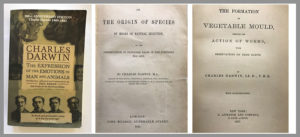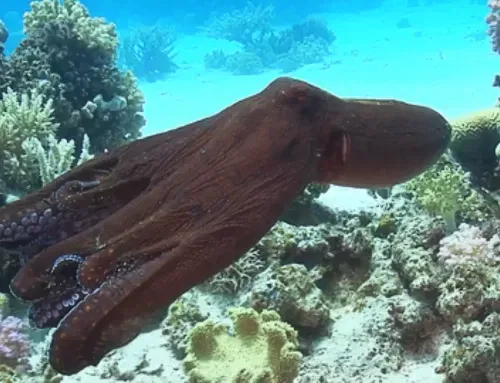
Let me state outright: I am not a supporter of “alternative facts” and am equally aghast at the concept of “fake news,” which we are bombarded with at present. Lies are sadly common these days, but I believe politicians, not journalists, are the guilty party. I am a scientist and believe in observed facts. Claims that a photograph of a crowd with large empty sections shows more people than another photograph of a crowd in the same space at a similar magnification with no empty sections are nonsense. Count the people in both photographs. The difference in the number is a scientific fact.
But, ambiguity in science – the role of speculation and story – is another matter.
Last Saturday I was the speaker at Darwin Day, an annual affair of the Humanists of Sarasota Bay in Sarasota, Florida. Humanists form a national society comprising hundreds of local chapters of individuals who, to the best of my knowledge, are pro-science and believe humans are responsible for their fate rather than an abstract God. Darwin Day, then, is most appropriate, for Darwin’s biggest challenge was fighting the tide of religion insisting that God created all species as they are today. In fact, the pressure of religion was so great, not only from society but from his religious wife, that he waited 22 years to publish his famous Origin of Species (1859). His sketchbook showed already in 1837 the concept of a branching evolutionary tree. In my opinion, Humanists are a welcome relief from religious fundamentalists that cause such chaos in the world, deny evolution and have disdain for science, such as climate change, which they consider fake news. Good grief!
For my lecture I talked about Darwin’s evolutionary tree, but not in the classical and, I believe, misleading sense that evolution is an incremental rise from “lower” to “higher” species, culminating in humans. In my lecture I blended my penchant for writing with my love of science and discussed how Darwin’s tree was a metaphor implying, incorrectly, that species evolved as a progression up the trunk to the top of the tree. Evolution is really about adaptation to different environments, or niches. Thus jellyfish swimming in the sea, worms buried in the soil, and birds navigating the sky are all highly evolved. Different species are born as they split off from common ancestors in their lineages, not one directly from another. One might argue that jellyfish, worms and birds, which all preceded humans on this planet, had longer to make adaptive modifications for improvement than we relative newcomers. “Primitive” is a poor term to mean an earlier presence on Earth.
Another aspect of science I considered in my talk is that science is neither nature itself nor a barrel of facts. Science is an interpretation of nature and is constantly placing data and observations into a narrative – a story – that can be communicated. These stories constantly change as new data and new observations are made. If scientific stories change with new facts, how could any one story be considered absolutely true and not permit more changes to be made? And stories involve speculation, a fictional forerunner of possible truth. Where would science be today if scientists would be so obsessed with facts that they didn’t speculate and give free reign to imagination?
This led me to a less known, more ambiguous aspect of Darwin’s contributions. He wrote a book on The Expression of the Emotions in Man and Animals. The book discusses many emotions – pain, pleasure, fear and others – showing similarities in expression in man and animals that fall in the domain of evolution. Emotions blend into behavior and then thought and intelligence. I have often pondered the evolution of thought and intelligence, and that is an important theme – storyline – of my novel, Jellyfish Have Eyes.
Today there’s a great deal of attention to animal intelligence. A New York bestseller, Alex & Me by Irene Pepperberg describes how her parrot Alex associated colors with shapes, apologized for misbehaving, teased people by playing games, demanded certain foods, acted as the boss, and more. That Alex was intelligent was beyond dispute; only the nature of intelligence remained debatable.
Then there is the extraordinary octopus and other cephalopods (squid and cuttlefish). A recent book, Other Minds: The Octopus, the Sea, and the Deep Origins of Consciousness by Peter Godfrey-Smith, a philosopher, tells about the surprising behavior of these invertebrates. An octopus can learn how to open a bottle by watching how another octopus does it, show curiosity, have different moods – friendly, aggressive, timid – and escape from their aquaria. They change colors and patterns quickly, as if there were an octopus language that we have yet to learn. Since invertebrates (octopus) and vertebrates (Alex and humans) split apart from a common ancestor hundreds of millions of years ago, their brains evolved in parallel with each other, leading to different ways of sensing and dealing with their environments. Intelligence need not be defined in the same way in vertebrates and invertebrates, or in any two species for that matter.
Darwin even studied the behavior of the deaf and blind (but partly light-sensitive) earthworms and wrote a book, The Formation of Vegetable Mould, Through the Action of Worms, with Observations on their Habits, on his findings. He concluded that these apparently “stupid” animals show some intelligence that relate to their way of life. They grabbed triangular leaf bits, or pieces of paper, by the pointed ends more often than by the flat surfaces to drag them into their tubular burrows. Darwin wrote, “It is…surprising that they apparently exhibit some degree of intelligence…in their manner of plugging up the mouths of their burrows. They act in nearly the same manner as would a man who had to close a cylindrical tube with different kinds of leaves…for they commonly seize such objects by their pointed ends.”
Earthworms intelligent!
Still other recent experiments by P. Fossat and D. Cattaert, reported in the New York Times (2014) suggested that crayfish have an inner life involving stress and anxiety, as judged by their behavior when shocked, their serotonin levels and relief of anxiety by the anti-anxiety drug Librium .
Anxiety in crayfish!
So we are learning today what Darwin suspected almost 150 years ago: “lower” animals are not that low. They are just different from us. Animals displayed and evolved complex behavior and intelligence from the beginning.
Enter my novel – fiction – where my scientist/protagonist Ricardo Sztein suggests from his experiments that jellyfish interact, have different personalities, remember, and even visualize evolution. Sounds crazy? Well, maybe it is, today, but thinking that parrots can converse knowledgeably with humans, that earthworms can figure out which part of a leaf is best to drag into their burrows, and that crayfish can suffer anxiety that is relieved by an anti-anxiety drug for humans might have also sounded crazy before anyone looked more carefully.
So “alternate facts” and “fake news” are nonsense, but science – the gold standard of factual truth – has elements of speculation that, when tested, may turn stories that sound like fiction into facts.






While reading a biography of Leo Tolstoy, the town named Piatagorsk was mentioned.This reminded me of an officer in the corp of cadets at Black Foxe military Institute many years ago.When he was a senior, I was probably in the fifth or sixth grade.One of my classmates, Michael Mathay (sp?) had an older brother who also was one of the three senior officers at that time.I was a young Militarist at the time; ironically having spent my adult years working as an artist (painter: kenmdaly.blogspot.com).
At any rate, the name Piatagorsk propelled me to Google your full name, and was happy to read of your brilliant career in science, and your ongoing commitment to writing.It pleases me to be able to connect that which is but a memory of “auld lange syne” to the contemporary Dr Piatigorsky.
As an aside, my old classmate Tick Matthay has also had a very successful career in Science (medicine).